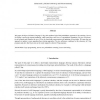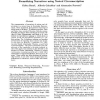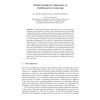1137 search results - page 29 / 228 » Knowledge Representation with Logic Programs |
120
Voted
WCRE
2009
IEEE
15 years 9 months ago
2009
IEEE
Abstract—The principles and best practices of object oriented design require that modules in a program should match logical decomposition of the knowledge that the program implem...
126
Voted
LPNMR
2004
Springer
15 years 8 months ago
2004
Springer
This paper develops a declarative language, P-log, that combines logical and probabilistic arguments in its reasoning. Answer Set Prolog is used as the logical foundation, while c...
132
click to vote
AAAI
1996
15 years 3 months ago
1996
The representation of narratives of actions and observations is a current issue in Knowledge Representation, where traditional plan-oriented treatments of action seem to fall shor...
105
click to vote
CIA
2006
Springer
15 years 6 months ago
2006
Springer
The paper describes a decentralized peer-to-peer multi-agent learning method based on inductive logic programming and knowledge trading. The method uses first-order logic for model...
120
Voted
JFLP
2002
15 years 2 months ago
2002
We present a practical partial evaluation scheme for multi-paradigm declarative languages combining features from functional, logic, and concurrent programming. In contrast to pre...



